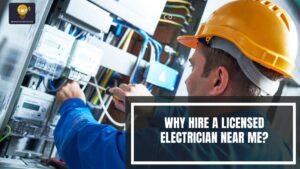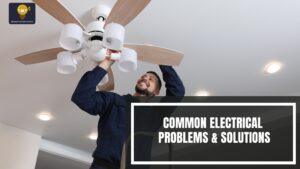Essential Guide to Professional Electrical Installation Services
Electrical issues like faulty wiring, frequent power surges, and unreliable outlets can quickly escalate from minor inconveniences to serious hazards. They can lead to expensive repairs and put your safety at risk, causing potential fire hazards and damaging valuable appliances. It’s easy to ignore electrical problems until they worsen, but waiting too long can have devastating consequences. This blog will explore why professional electrical installation services are crucial for safety and functionality. The good news is that expert electricians provide the necessary skills and experience to ensure your systems are set up safely and effectively. With the right experts, you can avoid these risks and enjoy a secure, reliable electrical setup in your home or business.
What is Electrical Installation?
Electrical installation refers to installing and connecting electrical systems, components, and equipment in a building or structure. This includes wiring, electrical panels, lighting, power outlets, and any other electrical infrastructure necessary for the building’s functionality. Electrical installation services must adhere to strict safety standards and local electrical codes to avoid hazards such as fires or electrical shocks.
Types of Electrical Installations
Experts categorize electrical installations into various types, each serving a different purpose.
- Residential electrical installations: Wiring and electrical components installed in homes.
- Commercial electrical installations: Larger-scale electrical setups for offices, stores, and other commercial establishments.
- Industrial electrical installations: Heavy-duty electrical systems used in factories and warehouses.
- Outdoor electrical installations: Wiring and components for outdoor settings, such as garden lighting, outdoor outlets, or security systems.
Why Is Professional Electrical Installation Important?
- Safety First
One of the biggest reasons to hire a professional for electrical installation is safety. Improper installation can lead to electrical hazards, including fires, electrocution, and system malfunctions. An experienced electrician will ensure that your electrical systems are installed correctly, minimizing any potential risks. - Compliance with Building Codes
Local building codes dictate how electrical installations should be done. Professionals are well-versed in these codes and will make sure your installation complies with them, preventing costly fines or the need for reinstallation. - Long-Term Cost Savings
Hiring a professional may seem more expensive upfront, but it can save you money in the long run. Proper electrical installation leads to better energy efficiency, fewer repairs, and reduced energy costs. A job well done ensures your system runs smoothly for years.
Key Electrical Installation Services Offered
Professional electrical installation services cover a wide range of needs, including
- Electrical Panel Installation
The electrical panel, also known as the circuit breaker panel, is the heart of any electrical system. This installation service is critical for homes or businesses that require significant electrical load or need to upgrade their panel for modern appliances and devices. A properly installed electrical panel ensures the safe distribution of electricity throughout your home or office. - Outdoor Electrical Installation
Outdoor electrical installation is essential for any property with outdoor lighting, electric gates, water features, or outdoor living spaces that require power. From installing outdoor outlets to setting up wiring for garden lights, it’s vital to have a professional handle outdoor electric installation to prevent exposure to the elements that could lead to wiring faults. - Electric Installation for New Construction
Whether you’re building a new home or office, electric installation is a crucial part of the process. This service includes wiring all rooms, installing outlets and switches, and connecting your home to the power grid. - Lighting Installation
Installing lighting systems—whether for general use or specialized purposes like ambient or task lighting—requires precise planning and execution. A professional electrician can help design and install lighting systems that meet your needs while ensuring safety and functionality. - Upgrades and Troubleshooting
If your current electrical system isn’t meeting your needs or if you’ve noticed frequent electrical issues, it’s time to consider an upgrade. This could involve installing new outlets, adding additional circuits, or troubleshooting existing issues to ensure your system is running efficiently.
Choosing the Right Service for Electrical Installation
When selecting an electrical installation service, it’s essential to consider several factors:
- Experience and Expertise
Look for a service provider with years of experience in the electrical installation field. Their expertise in handling different types of installations ensures that your project will be completed to the highest standards. - Licensed and Insured
Always hire a licensed and insured electrician to handle your electrical installations. Licensing indicates that the electrician has completed the necessary training and is qualified to perform electrical work. Insurance protects you in case of accidents or damage during installation. - Reputation and Reviews
Check reviews and ask for references. A reputable electrical installation service should have positive feedback from previous clients. Online reviews and personal recommendations can give you an idea of the quality of work to expect. - Cost and Estimates
Always request an estimate before starting any electrical installation project. A reliable electrician will provide a clear and detailed estimate that covers all aspects of the job, from labor to materials. Compare estimates from different services to ensure you’re getting a fair price.
The Electrical Installation Process Explained
Understanding the installation process can help you prepare and ensure everything is done correctly. Here’s a general overview:
- Planning & Design: Based on your structure and power needs, the electrician creates a detailed wiring map.
- Permitting & Code Compliance: Professional installers pull the necessary permits and ensure all work complies with local regulations.
- Installation of Wiring & Devices: This includes running wires, installing outlets, switches, lights, and the electrical panel.
- Testing & Inspection: The system is tested for faults, and final inspections are conducted before power is activated.
Costs of Electrical Installation Services
The electrical installation cost varies depending on the project’s complexity, the installation type, and the time required. While prices can differ, getting an estimate upfront is essential to ensure that all costs are transparent.
Factors Affecting Costs
Some factors that influence the cost of installation include the size of the building, the complexity of the electrical system, and any necessary upgrades to your current setup.
Average Cost for Common Electrical Installations
Here are some average costs for standard electrical systems:
- Electrical panel installation: $1,000 – $2,500
- Outdoor electrical installations: $200 – $2,000 (depending on the setup)
- Smart home systems: $1,000 – $5,000
Maintaining Electrical Systems
Regular maintenance is key to ensuring the safety and longevity of your electrical system.
Routine Inspections and Upkeep
Electricians recommend routine inspections of your electrical system to identify any potential issues before they become significant problems.
Safety Considerations in Electrical Installations
Ensuring that your electrical installation meets safety standards is non-negotiable. Improper installation can result in dangerous hazards such as fires or electric shocks.
Common Electrical Installation Hazards
Knowing the most common electrical installation hazards, such as overloading circuits or improper grounding, is essential.
Electrical Codes and Standards
Electrical installations must adhere to local and national electrical codes, which are in place to ensure the safety of the installation.
FAQs
1. What is the difference between residential and commercial electrical installations?
Residential installations are for homes, while commercial installations are tailored to meet the needs of businesses, such as higher power requirements.
2. How long does it take to install an electrical panel?
Electrical panel installation typically takes 4-8 hours, depending on the complexity of the setup.
3. Is it safe to attempt electrical installation myself?
Electrical installation services should only be done by a licensed professional to ensure safety and compliance with electrical codes.
4. Can I upgrade my electrical panel?
Yes, upgrading your electrical panel is recommended for adding new appliances or experiencing power surges.
5. How much do outdoor electrical systems cost?
Outdoor installations can range from a few hundred to several thousand dollars, depending on the complexity.
6. Do I need a permit for electrical installation?
Yes, most electrical installations require a permit, especially for new builds, major upgrades, or outdoor installations.
Conclusion
Electrical installation services are crucial for ensuring your home or business’s safe and efficient operation. Whether installing a new electrical panel, upgrading an existing system, or incorporating outdoor electrical setups, hiring a professional service is essential. By selecting licensed and experienced electricians, you can ensure that your electrical systems are installed safely and up to code.
For reliable and safe electrical installation, trust NT Electrician. Contact us today for expert services that meet all your electrical needs and ensure peace of mind!




